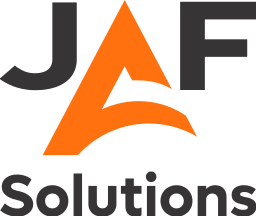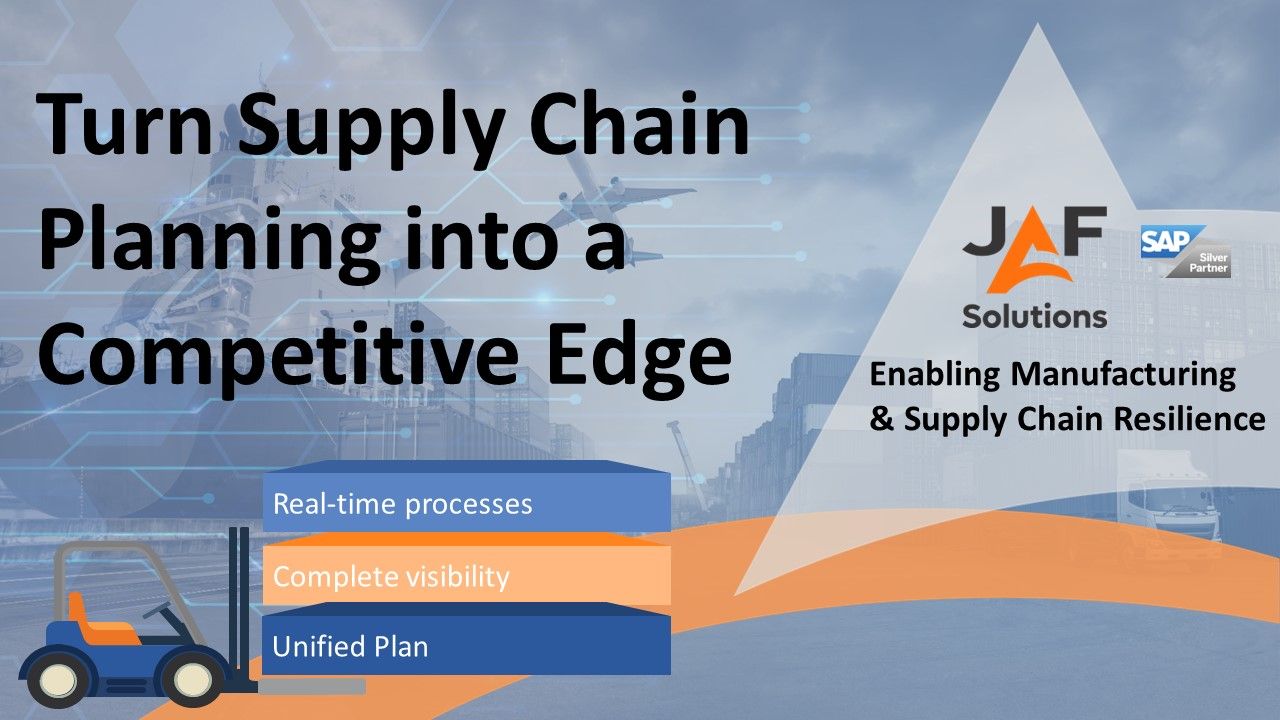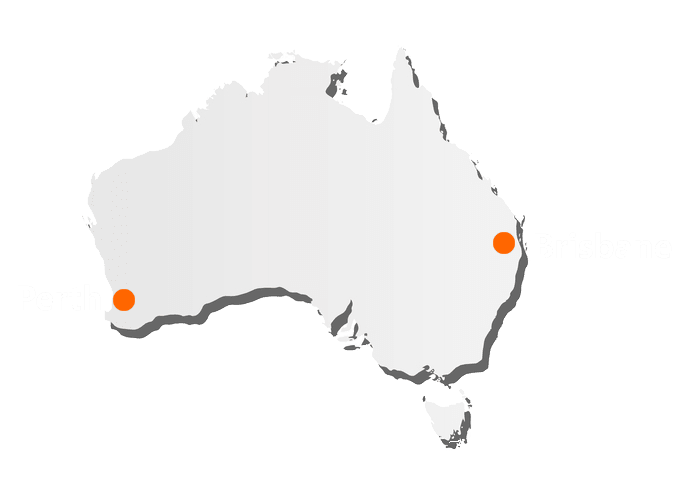Businesses of all sizes are experiencing pressure on their supply chains. No matter what size of the company, supply chains are just as complicated and sometimes more complex for smaller companies and they have the same needs no matter what size. There is no correlation between company size and complexity. The competitive edge for all businesses will come from diversifying supply chains, being more forward-looking, transforming processes where needed and adding technology to support transformation.
Supply chain planning is an area where a business should focus to gain a competitive edge. But where to start? Start by focusing on 3 main areas:
Supply chain planning is an area where a business should focus to gain a competitive edge. But where to start? Start by focusing on 3 main areas:
1
Unified plan, rigour and discipline in the planning process as well as all stakeholders working on the same plan.
Having a unified supply chain plan means that all aspects of the supply chain, from sourcing raw materials to delivering the final product to customers, are integrated and aligned towards a common goal avoiding conflicting objectives and ensuring that the entire supply chain functions cohesively. With all areas of a business working together seamlessly, reducing inefficiencies and bottlenecks.
To gain an advantage your supply chain plan shouldn’t be set and forget, regular reviews of the plan's performance are essential to identify areas of improvement and make necessary adjustments. With rigorous analysis and data-driven decision-making businesses can better anticipate and mitigate potential disruptions, manage inventory levels effectively, and optimise the use of resources.
Having a unified supply chain plan allows to proactively address potential risks and challenges in the supply chain. By clearly understanding the entire process, contingency plans can be developed and flexibility built in to adapt quickly to unforeseen circumstances, such as natural disasters, supply shortages, or changes in customer demand.
To gain an advantage your supply chain plan shouldn’t be set and forget, regular reviews of the plan's performance are essential to identify areas of improvement and make necessary adjustments. With rigorous analysis and data-driven decision-making businesses can better anticipate and mitigate potential disruptions, manage inventory levels effectively, and optimise the use of resources.
Having a unified supply chain plan allows to proactively address potential risks and challenges in the supply chain. By clearly understanding the entire process, contingency plans can be developed and flexibility built in to adapt quickly to unforeseen circumstances, such as natural disasters, supply shortages, or changes in customer demand.
2
Visibility, complete visibility across a company’s operations and with business partners.
With full visibility, businesses can identify inefficiencies, bottlenecks, and redundancies in their supply chain processes. This enables optimised operations, streamlined workflows, and reduced wastage of resources, ultimately leading to cost savings.
If real-time visibility is achieved then this allows quick response to disruptions, changes in demand, or supply chain issues. By having a clear picture of inventory levels, production status, and logistics, proactive decisions can be made to address potential problems before they escalate.
Understanding the entire supply chain enables the identification and mitigation of potential risks. Whether it's supplier dependencies, geopolitical issues, or environmental risks, having visibility allows for the development of contingency plans and diversified sourcing to minimise disruptions.
In today's fast-paced business landscape, supply chain visibility can become a significant competitive advantage. Those who can efficiently manage their supply chain and respond promptly to market changes gain an edge over their competitors.
If real-time visibility is achieved then this allows quick response to disruptions, changes in demand, or supply chain issues. By having a clear picture of inventory levels, production status, and logistics, proactive decisions can be made to address potential problems before they escalate.
Understanding the entire supply chain enables the identification and mitigation of potential risks. Whether it's supplier dependencies, geopolitical issues, or environmental risks, having visibility allows for the development of contingency plans and diversified sourcing to minimise disruptions.
In today's fast-paced business landscape, supply chain visibility can become a significant competitive advantage. Those who can efficiently manage their supply chain and respond promptly to market changes gain an edge over their competitors.
3
Integrated business planning (IBP) system to enable real-time processes and have visibility across the supply chain.
As we say, “Growing Resilience with Technology as an enabler”, a quality IBP system is required to enable real-time processes and visibility across the supply chain. Without a system, businesses of any size will be unable to enable real-time visibility and processes and therefore lack the ability to make well-informed decisions quickly, optimise their supply chain performance, and adapt swiftly to changing circumstances. This level of real-time visibility and collaboration delivered by an IBP system leads to improved operational efficiency, reduced costs, and enhanced customer satisfaction.
The Value is Clear
Integrated business planning can improve revenue, operating costs and asset utilisation/working capital
Revenue
| Tangible Benefits* | % Impact |
|---|---|
| Top line revenue growth | 1-2% |
| In-stock % improvement | 20-30% |
| Service level increase | 5-10% |

Operating cost
| Tangible Benefits* | % Impact |
|---|---|
| Improved planner productivity | 20-30% |
| Order fulfillment lead time reduction | 10-20% |
| Inventory carrying cost reduction | 5-10% |
Asset Utilisation/Working capital
| Tangible Benefits* | % Impact |
|---|---|
| Reduction in inventory levels | 5-15% |
| Inventory turns increase | 5-10% |
| Cash-to-Cash cycle time reduction | 5-10% |
* IBM, Aberdeen & Gartner Case Studies & Benchmarks from SAP Value Engineering
Summary
Supply chain planning is a strategic area that deserves careful attention from businesses looking to gain a competitive edge. By adopting a unified plan, maintaining rigour and discipline, and fostering collaboration among stakeholders, supply chain operations can be optimised and ultimately achieve better overall performance and customer satisfaction. An IBP System is an essential component to enabling a competitive edge for businesses.
But why SAP IBP?
Some perceive SAP as too big to work with, too expensive, and too complicated for companies to leverage. Although it’s true that SAP can be found in most of the largest companies of the world but it is a misconception that SAP is too big, too complicated, and too expensive for other companies. The majority of customer for SAP Integrated Business Planning are midsize companies, they are leveraging planning to help them become more resilient and to grow.
SAP IBP scales to accommodate business growth and integrates with other SAP and third-party systems so there are no barriers to companies of any size being able to leverage their data to drive efficiency and profitability.
But why SAP IBP?
Some perceive SAP as too big to work with, too expensive, and too complicated for companies to leverage. Although it’s true that SAP can be found in most of the largest companies of the world but it is a misconception that SAP is too big, too complicated, and too expensive for other companies. The majority of customer for SAP Integrated Business Planning are midsize companies, they are leveraging planning to help them become more resilient and to grow.
SAP IBP scales to accommodate business growth and integrates with other SAP and third-party systems so there are no barriers to companies of any size being able to leverage their data to drive efficiency and profitability.
Contact us to find out more
Speak to us about how our team can assist you.
Planning Usage Statistics
From the 2022 SAP IBP for Supply Chain Annual Customer Report we can see the increase in use of planning statistics with the solution as well as a few fun facts on how many rail tracks, french fries, milk and of course beer SAP IBP has helped to get moving!
0
SAP IBP Systems
0
Microsoft Excel Logins Daily
0
Average Workday Users Access IBP in 2022
0
Customers with > 1,000 registered users in SAP IBP
0
Thousand Miles of Rails
0
Million Tons of Frozen French Fries
0
Billion Gallons of Milk
0
Billion Pints of Beer



